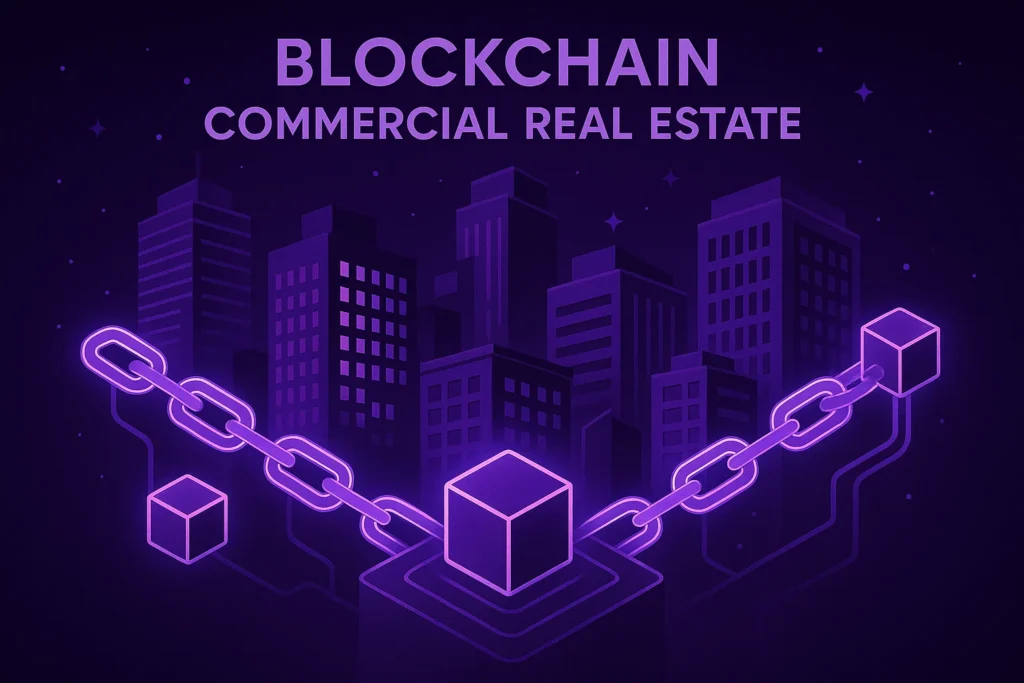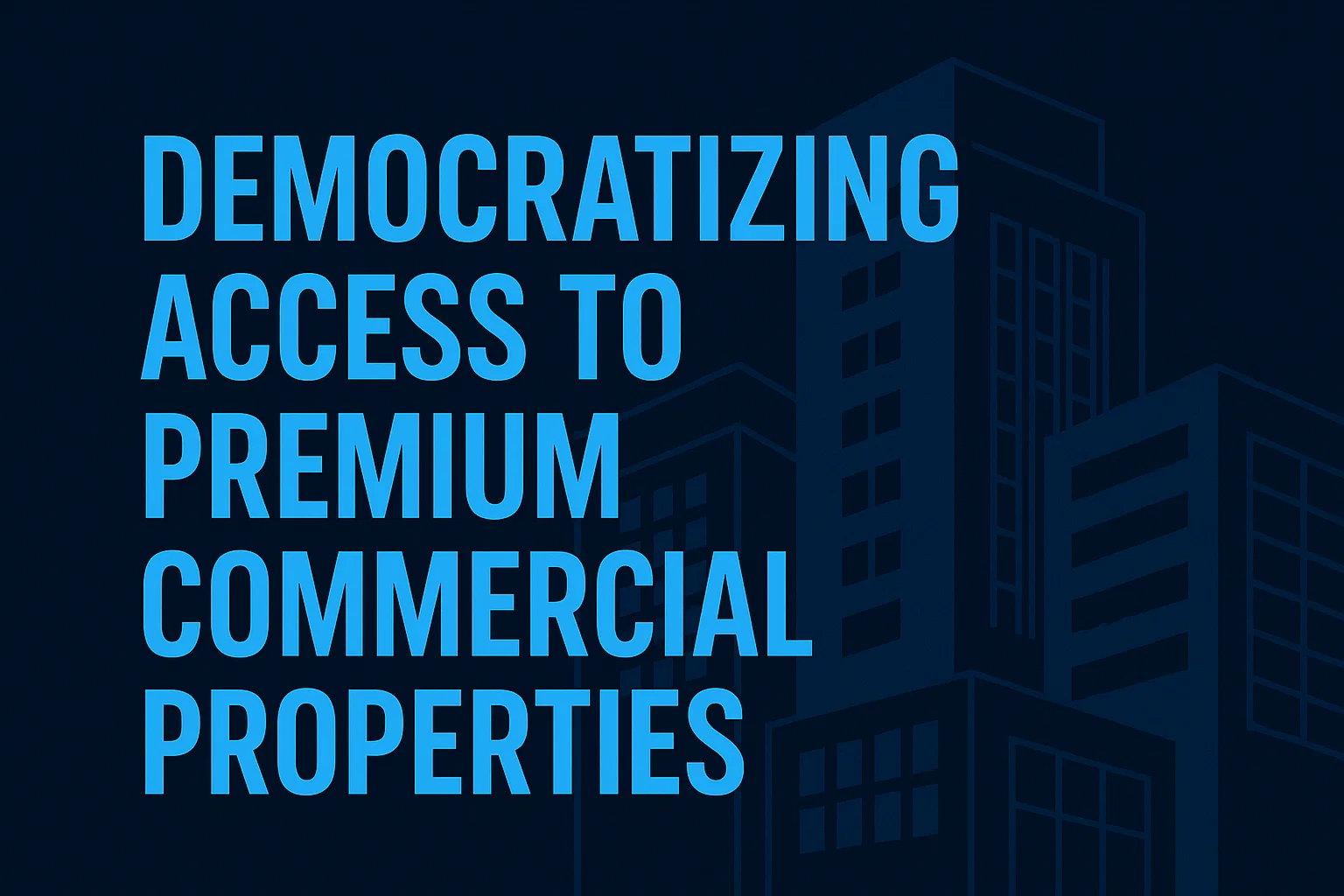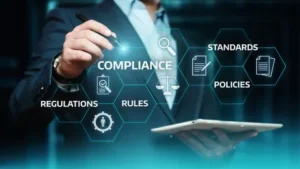The commercial real estate industry, traditionally known for its resistance to change and reliance on paper-based processes, is experiencing a seismic shift. Blockchain commercial real estate applications are fundamentally transforming how properties are bought, sold, financed, and managed. This technology, which once seemed relegated to cryptocurrency enthusiasts, is now positioned to unlock an estimated $1.4 trillion in value across global real estate markets by 2030. While most investors remain unaware of this transformation, forward-thinking developers, institutional investors, and proptech companies are quietly revolutionizing property transactions through distributed ledger technology, smart contracts, and tokenization. The implications extend far beyond simple digitization—blockchain commercial real estate solutions are democratizing access to premium properties, eliminating intermediaries, and creating unprecedented liquidity in historically illiquid markets.
Blockchain Foundation in Property Markets
Before exploring the revolutionary applications, it’s essential to understand what makes blockchain technology in commercial real estate so transformative. Unlike traditional databases controlled by single entities, blockchain operates as a distributed ledger where transaction records are stored across multiple computers simultaneously. This decentralized architecture creates an immutable record of ownership, transfers, and property history that cannot be altered retroactively without consensus from the network.
For commercial real estate, this means title records, lease agreements, property deeds, and transaction histories can be recorded permanently and transparently. The technology eliminates the need for multiple intermediaries to verify information, reducing transaction times from months to days or even hours. Smart contracts—self-executing agreements with terms written directly into code—automatically enforce contractual obligations when predetermined conditions are met, removing human error and reducing costs by up to 40% in some transactions.
The Technology Behind Property Tokenization
Blockchain commercial real estate tokenization represents perhaps the most disruptive application of this technology. Tokenization converts ownership rights in physical properties into digital tokens that can be bought, sold, and traded on blockchain platforms. Each token represents a fractional ownership stake in a property, similar to owning shares in a company.
A $50 million office building, for instance, might be divided into 50 million tokens, each worth $1. Investors can purchase as few or as many tokens as they wish, dramatically lowering the barrier to entry for commercial real estate investment. These tokens can be traded on secondary markets, providing liquidity that has never existed in traditional commercial property markets, where finding buyers for multi-million-dollar assets can take months or years.
How Blockchain Is Transforming Transaction Efficiency
Traditional commercial real estate transactions involve numerous intermediaries—brokers, lawyers, title companies, escrow agents, and banks—each adding time, cost, and complexity to deals. The average commercial property transaction takes 60-90 days to close, with transaction costs reaching 5-10% of the property value.
Blockchain commercial real estate platforms are compressing these timelines dramatically. By creating a single, shared source of truth accessible to all authorized parties, blockchain eliminates redundant verification processes. Smart contracts automatically trigger payments, transfer ownership, and update records when conditions are met, removing delays caused by manual processing and coordination among multiple parties.
Recent transactions using blockchain technology have closed in as little as 10 days, with transaction costs reduced by 30-50%. A 2024 commercial property sale in Manhattan using blockchain settlement reduced closing costs from $240,000 to $85,000—savings that benefit both buyers and sellers while maintaining security and compliance.
Eliminating Title Fraud and Ownership Disputes
Title fraud costs the commercial real estate industry billions annually. Traditional paper-based systems are vulnerable to forgery, errors, and disputes over property ownership. Blockchain’s immutable ledger creates a permanent, tamper-proof record of ownership that dramatically reduces fraud risk.
Several countries are already implementing blockchain-based property registries for commercial real estate. Sweden’s land registry authority has tested blockchain for property transactions since 2016, while Dubai aims to have all real estate transactions on blockchain by 2025. These systems create an unbroken chain of title that can be verified instantly, eliminating the need for expensive title insurance in many cases.
Democratizing Access to Premium Commercial Properties
Historically, commercial real estate investment has been the preserve of wealthy individuals and institutional investors. The high capital requirements—often millions of dollars for a single property—excluded average investors from accessing this asset class known for stable returns and portfolio diversification benefits.
Blockchain commercial real estate tokenization is dismantling these barriers. Through fractional ownership models, investors can now purchase stakes in premium office towers, shopping centers, industrial facilities, and mixed-use developments with investments as small as $100. This democratization opens massive new capital pools while providing developers and property owners with alternative funding sources beyond traditional bank loans and institutional capital.
A Manhattan office building valued at $30 million might be tokenized and offered to thousands of small investors rather than being sold to a single buyer or syndicate. Each token holder receives proportional rental income and benefits from property appreciation, with tokens freely tradable on secondary markets. This model has already facilitated over $8 billion in blockchain commercial real estate transactions globally as of 2024.
Creating Liquidity in Illiquid Markets
Commercial real estate has always suffered from illiquidity—the difficulty of quickly converting property assets into cash without significant price concessions. Finding qualified buyers for large commercial properties takes time, and economic downturns can make sales nearly impossible without substantial discounts.
Blockchain tokenization solves this problem by creating secondary markets where property tokens trade continuously. Rather than selling an entire building, owners can sell tokens representing partial ownership, accessing capital quickly without triggering major transactions. Investors can similarly exit positions by selling tokens on exchanges, much like trading stocks, without waiting for property sales or fund liquidation events.
This liquidity transformation is particularly valuable during economic uncertainty. During the 2023 commercial real estate slowdown, tokenized properties maintained significantly better liquidity than traditional holdings, with investors able to adjust exposure without the fire-sale dynamics that plagued conventional markets.
Smart Contracts Revolutionizing Property Management
Beyond transactions, blockchain commercial real estate applications extend into ongoing property operations. Smart contracts automate routine management tasks, reducing costs while improving tenant experiences and operational efficiency.
Lease agreements coded as smart contracts automatically process rent payments, trigger late fees, release security deposits based on inspection results, and execute renewal options without manual intervention. Utility payments, maintenance schedules, and service contracts can similarly be automated, with blockchain creating transparent records of all activities.
A commercial property management company implementing blockchain-based systems reported a 60% reduction in administrative costs and a 45% improvement in tenant satisfaction scores. Tenants appreciated transparent, automated processes, while property managers redirected time from paperwork to value-added services.
Streamlining Property Due Diligence
Due diligence—the investigation process buyers conduct before purchasing property—traditionally involves reviewing mountains of documents: financial statements, lease agreements, inspection reports, environmental assessments, and property histories. This process takes weeks and costs tens of thousands of dollars.
When property information resides on blockchain, due diligence becomes dramatically more efficient. Complete property histories, including all maintenance records, tenant information, financial performance, and legal documents, can be accessed instantly by authorized parties. The immutable nature of blockchain records provides confidence in data accuracy, reducing the need for extensive third-party verification.
Blockchain commercial real estate platforms are integrating artificial intelligence to analyze blockchain-stored property data automatically, flagging potential issues and generating comprehensive due diligence reports in hours rather than weeks. This efficiency accelerates transactions while improving decision-making quality.
Real-World Applications and Success Stories
The blockchain commercial real estate revolution isn’t theoretical—it’s happening now across global markets. Understanding real-world implementations illustrates the technology’s practical impact and future trajectory.
In 2021, a luxury hotel in Aspen, Colorado, became one of the first major commercial properties tokenized on blockchain. The $18 million property was divided into tokens sold to thousands of investors worldwide, raising capital in weeks rather than the months traditional financing would require. Token holders receive proportional income from hotel operations and can trade their stakes on secondary markets, creating unprecedented flexibility.
Singapore’s PropTech ecosystem has embraced blockchain for commercial real estate, with several prominent office buildings tokenized and traded on regulated platforms. The country’s government actively supports these innovations, viewing blockchain as a competitive advantage in global real estate markets.
Institutional Adoption Gaining Momentum
Major institutions are moving beyond pilot programs to operational implementation. Real estate investment trusts (REITs), pension funds, and institutional asset managers are incorporating blockchain commercial real estate capabilities into their technology stacks.
Blackstone, the world’s largest commercial real estate investor, has invested heavily in blockchain infrastructure and proptech companies developing tokenization platforms. JPMorgan has created blockchain-based solutions for real estate transactions, while HSBC and other major banks are developing custody services for tokenized property assets.
This institutional adoption validates the technology’s maturity and signals a tipping point where blockchain transitions from emerging innovation to standard infrastructure across commercial real estate markets.
Regulatory Landscape and Compliance Considerations
As with any financial innovation, blockchain commercial real estate operates within complex regulatory environments that vary significantly across jurisdictions. Understanding regulatory frameworks is essential for investors, developers, and technology providers.
The United States Securities and Exchange Commission (SEC) treats most tokenized real estate offerings as securities, subjecting them to registration requirements and investor protection regulations. This classification requires issuers to comply with disclosure obligations, anti-money laundering protocols, and accredited investor restrictions in many cases.
However, regulatory clarity is improving. Several states have enacted blockchain-friendly legislation, and the SEC has approved multiple tokenized real estate offerings under Regulation D and Regulation A+ frameworks. These developments create pathways for compliant blockchain commercial real estate offerings while protecting investor interests.
International Regulatory Variations
Europe’s regulatory approach differs from the United States, with the European Union working toward comprehensive crypto-asset regulations under the Markets in Crypto-Assets (MiCA) framework. These regulations will provide clear standards for tokenized real estate across EU member states, potentially accelerating adoption.
Asian markets show diverse approaches. Singapore and Hong Kong have created regulatory sandboxes encouraging blockchain commercial real estate innovation while maintaining oversight. China, despite restricting cryptocurrencies, is exploring blockchain applications for property registries and government-controlled real estate platforms.
Navigating this regulatory patchwork requires sophisticated legal expertise, but regulatory evolution generally trends toward accommodation as governments recognize blockchain’s benefits for transparency, efficiency, and economic growth.
Challenges and Obstacles to Widespread Adoption
Despite enormous promise, blockchain commercial real estate faces meaningful obstacles that must be addressed for widespread adoption. Understanding these challenges helps set realistic expectations and identify areas requiring continued development.
Technology literacy remains a significant barrier. Many real estate professionals, investors, and property owners lack an understanding of blockchain fundamentals, creating resistance to adoption. Educational initiatives and user-friendly interfaces are essential for bridging this knowledge gap and demonstrating tangible benefits over traditional methods.
Integration with legacy systems presents technical challenges. Most commercial real estate organizations operate on decades-old software systems that weren’t designed to interface with blockchain platforms. Creating bridges between old and new systems requires significant investment and technical expertise that many organizations lack.
Scalability and Environmental Concerns
Some blockchain networks face scalability limitations that constrain transaction volumes and speed. While newer blockchain architectures address these issues through alternative consensus mechanisms, concerns about network capacity persist in some quarters.
Environmental impact has attracted attention, particularly regarding energy-intensive proof-of-work blockchains like Bitcoin. However, blockchain commercial real estate applications typically utilize more energy-efficient consensus mechanisms like proof-of-stake or permissioned networks that consume a fraction of the energy. Nevertheless, environmental considerations influence platform selection and development priorities.
Market fragmentation presents another challenge. Dozens of blockchain platforms compete for dominance in real estate applications, each with different technical specifications, security features, and ecosystems. This fragmentation creates uncertainty about which platforms will achieve widespread adoption and concerns about interoperability between systems.
The Economic Impact: Unlocking Trillions in Value
Analysts project blockchain commercial real estate applications could unlock $1.4 to $2.8 trillion in new value across global property markets by 2030. This value creation occurs through multiple channels that fundamentally reshape market economics.
Increased liquidity adds substantial value. Illiquid assets typically trade at discounts of 20-40% compared to liquid alternatives. By creating secondary markets for fractional property ownership, blockchain reduces this liquidity discount, immediately increasing property values without any physical changes to assets themselves.
Transaction cost reduction directly increases investment returns. When buying, selling, and financing costs decrease by 30-50%, more capital remains invested in properties rather than being consumed by intermediaries. Over investment horizons of 5-10 years, these savings compound significantly, improving investor returns and property valuations.
Expanding Global Capital Access
Blockchain commercial real estate platforms enable cross-border investment with unprecedented ease. Investors from emerging markets can allocate capital to premium properties in developed economies, while developers in growing markets can access international capital pools. This global capital flow increases property values in attractive markets while improving portfolio diversification for investors worldwide.
Small and medium-sized developers gain access to capital markets previously available only to large institutional players. A regional developer building a $10 million mixed-use project can tokenize the property and access thousands of individual investors rather than relying solely on expensive bank loans or wealthy partners. This democratization of capital accelerates development and economic growth.
Market efficiency improvements capture value lost to information asymmetries and inefficient processes. When all parties access the same transparent, real-time data about properties, transactions, and market conditions, pricing becomes more accurate and markets operate more smoothly. These efficiency gains translate to higher property values and better risk-adjusted returns.
Future Trends Shaping the Next Decade
The blockchain commercial real estate landscape continues evolving rapidly, with several emerging trends likely to dominate the next decade of development and adoption.
Integration with Internet of Things (IoT) devices creates “smart properties” where building systems communicate directly with blockchain platforms. Smart meters automatically record energy consumption, HVAC systems log maintenance activities, and security systems document access events—all stored immutably on blockchain. This integration improves property management efficiency while creating valuable data streams that enhance property valuations.
Artificial intelligence, combined with blockchain, enables sophisticated property analytics and automated decision-making. AI algorithms analyzing blockchain-stored property data can predict maintenance needs, optimize energy consumption, forecast rental income, and identify investment opportunities with unprecedented accuracy.
Decentralized Autonomous Organizations (DAOs) for Property Management
DAOs represent organizational structures governed by smart contracts rather than traditional management hierarchies. For blockchain commercial real estate, DAOs enable property owners to collectively make decisions about property management, capital improvements, and strategic direction through token-based voting systems.
Imagine an office building owned by 5,000 token holders worldwide. Rather than hiring a traditional property management company, owners form a DAO where they vote on major decisions proportional to their ownership stakes. Service providers compete for contracts, maintenance budgets are approved through democratic processes, and profits are distributed automatically via smart contracts. This model reduces management costs while giving owners unprecedented control.
Central bank digital currencies (CBDCs) will likely integrate with blockchain commercial real estate platforms, streamlining transactions and cross-border payments. When property transactions occur in blockchain-native currencies issued by central banks, settlement becomes instantaneous and transaction costs approach zero. Several countries developing CBDCs explicitly consider real estate applications as primary use cases.
Investment Strategies for the Blockchain Real Estate Era
As blockchain commercial real estate matures, investors should consider strategic approaches to capitalize on this transformation while managing associated risks.
Diversification across both traditional and tokenized properties balances innovation exposure with proven investment models. Allocating 10-20% of real estate portfolios to blockchain-based investments allows participation in upside potential while limiting exposure to emerging technology risks.
Due diligence remains paramount, perhaps more so with tokenized properties. Investors should verify platform security, regulatory compliance, property quality, financial projections, and management capabilities as thoroughly as with traditional investments. The novelty of blockchain doesn’t eliminate fundamental investment principles.
Platform Selection Criteria
Choosing blockchain commercial real estate platforms requires evaluating multiple factors beyond marketing claims. Regulatory compliance and licensing verify legitimacy and legal protections. Security audits by reputable third parties confirm platform infrastructure can protect assets and data from cyber threats.
Track record matters—platforms with completed transactions, satisfied investors, and operational history demonstrate capability and reliability. User experience affects accessibility; platforms with intuitive interfaces and responsive customer support prove more practical for investors without deep technical expertise.
Liquidity provisions distinguish platforms. Secondary markets with active trading volumes provide genuine liquidity, while platforms lacking robust trading mechanisms may replicate the illiquidity problems they claim to solve.
Preparing for the Blockchain Commercial Real Estate Future
Whether you’re an investor, developer, property manager, or service provider, the blockchain commercial real estate revolution will impact your activities and opportunities. Proactive preparation positions stakeholders for success in this transforming landscape.
Education represents the critical first step. Understanding blockchain fundamentals, tokenization mechanics, smart contract capabilities, and regulatory frameworks enables informed decision-making and identification of opportunities. Numerous online courses, industry conferences, and professional development programs now address blockchain in real estate specifically.
Network with innovators and early adopters. Joining industry organizations focused on proptech and blockchain commercial real estate provides access to knowledge sharing, partnership opportunities, and market intelligence. These connections often lead to early access to platforms, investment opportunities, and strategic relationships.
Building Technical Capabilities
For organizations, developing internal blockchain expertise through hiring, training, or consulting partnerships ensures the capability to evaluate technologies, implement solutions, and capitalize on opportunities. Real estate companies treating blockchain as peripheral rather than central to future strategy risk competitive disadvantage as adoption accelerates.
Experimentation with pilot projects allows organizations to gain practical experience with manageable risk. Tokenizing a single property, implementing blockchain-based lease agreements for one building, or participating in industry consortiums developing standards provides learning opportunities without betting entire businesses on unproven technologies.
Conclusion
The quiet revolution transforming commercial real estate through blockchain technology represents one of the most significant industry shifts in modern history. Blockchain commercial real estate applications are dismantling barriers that have defined property markets for centuries—illiquidity, high transaction costs, limited access, and operational inefficiency—while creating unprecedented opportunities for value creation and market participation.
The technology’s potential to unlock trillions in new value isn’t speculative; it reflects quantifiable improvements in liquidity, efficiency, accessibility, and transparency that directly translate to higher property values and superior investment returns. As institutional adoption accelerates, regulatory frameworks mature, and technological capabilities expand, blockchain will transition from innovative experiment to standard infrastructure underlying global commercial real estate markets.



